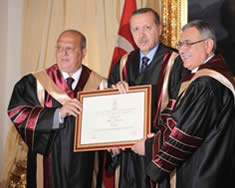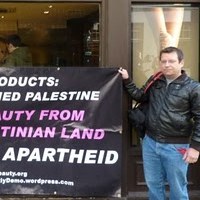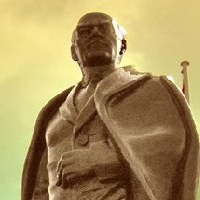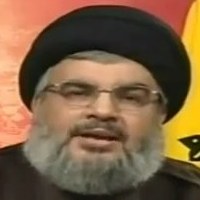Mon, July 05, 2010 | Hurriyet Daily | By Soner Cagaptay
The AKP’s Hamas Policy: “Us vs. Them”
At home, the Justice and Development Party, or AKP, has promoted the Islamist mindset of “us Muslims” in conflict with “the bad others” through the media and also by spreading Hamas’ views throughout Turkey, whether through official Hamas visits to Turkey or through AKP-supported conferences and fundraisers.
Recent changes in media ownership in Turkey under the AKP are closely related to the spread of anti-Western sentiments in the country. Turkey is a country with free media. Media independence in Turkey, however, is increasingly under threat.
The Turkish media remains free (in that it is not illegal to produce journalism), but the AKP is trying to curb media freedoms by transforming media ownership through legal loopholes. Such was the case in December 2005 when the AKP took over the Sabah-ATV conglomerate, which represents around 20% of the Turkish media market, selling this conglomerate to a media company of which Turkish Prime minister Recep Tayyip Erdogan’s son-in-law Berat Albayrak is the CEO.
The AKP has also brought a $3.2 billion tax fine against Dogan Yayin, a conglomerate that owns around 50 percent of the Turkish media. This excessive fine exceeds Dogan’s total net worth—is political, because Dogan’s news outlets promote secular, liberal and nationalist views that often criticize of the AKP.

April 17, 2010, Turkish Prime Minister Tayyip Erdogan receives an honorary PhD from the Hamas-controlled Islamic University in the Gaza Strip. The ceremony took place at the prime minister's home in Ankara. Present were Jamal al-Khudari, president of the university's board of trustees (who is also a Hamas activist and chairman of the Popular Committee to Lift the Siege of the Gaza Strip) and Kamalain Shaath, university president (Islamic University website).
The transformation of the Turkish media is not an esoteric issue, for it affects the future of Turkish democracy and also has a bearing on Turkish views of the world.
Where there is no independent media—as in Russia—there is simply no viable opposition to government. Whenever Turkey goes through a political spasm, analysts warn of the collapse of Turkey’s democracy. Despite this, Turkey has survived numerous crises in the past thanks to the balancing power of its fourth pillar.
As Turkish media becomes less free, there is a higher likelihood that it will become a tool for the government with which to shape an anti-Western public opinion. What is bad for secular liberal western Turks is bad for the West. Turkey’s free media needs to remain free because if it is all either state-owned or owned by pro-AKP businesses, anti-Western and anti-Israeli viewpoints will spread through the media, which we have been witnessing since 2002.
A recent show on Turkey’s publicly-funded Turkish Radio Television, or TRT, network is a perfect example. The debut of the series, entitled “Ayrilik” (Separation), came on the heels of Turkey’s cancellation of Israeli participation in the Anatolian Eagle exercises. TRT, whose head is appointed by the AKP, and which is entirely funded by Turkish taxpayer money, ran “Ayrilik,” a show with an anti-Israeli stance, including one which depicts an imagined situation in the Palestinian territories where a newborn baby is intentionally killed by Israeli soldiers.
What do 18-year-old Turks think of Israel now? They hate it, and they will do so because of images depicted in shows like “Ayrilik.” These are the images they have been seeing for the last seven years and this is what they’ll continue seeing. A Turk who has come of age under the AKP is now more likely than not to hate Israel and the West after seven years of such propaganda. Unlike Turks now in their forties or older who came of political age in a different Turkey, younger Turks in their twenties and thirties have more radical and negative views of the West as a result of what they see in government-controlled media as well as media owned by pro-government businesses.
Through Conferences
While government-controlled media promotes an evil image of the Israelis, international Hamas conferences in Turkey build legitimacy for Hamas and other extensions of the International Muslim Brotherhood movement. Before the AKP came to power, Turkey had never hosted a Hamas conference. Now, such conferences render the Hamas and Muslim Brotherhood agenda more accessible to Turks, making Hamas’ violent struggle against Israel a part of daily political debate in Turkey.
In the last three years alone, there have been seven Hamas conferences and fundraisers in Istanbul. The first one of these, held in July 2006 and attended by one of the spiritual leaders of the Egyptian Muslim Brotherhood, Sheikh Yousef al-Qaradawi, was given the title “Muslims in Europe.” Qaradawi’s visit was funded by the British Foreign Office, and Hamas and the Muslim Brotherhood came to talk about Muslims in Europe, exposing Turks and European Muslims to Hamas and its ideology.
The list continues: other Hamas and Muslim Brotherhood conferences in Turkey include a November, 2007 conference called “Jerusalem Day,” co-organized by nongovernmental organization the Association of Turkish Volunteer Organizations, or TGTV, close to the AKP and Islamic Association of Muslim World Nongovernmental Organizations, or IDSB. This conference, entitled “Jerusalem Day,” called for “liberating Jerusalem through jihad from the Zionists.”
Other conferences followed in February 2009, April 2009, May 2009, and July 2009. What is interesting is that the frequency of these conferences has been steadily increasing, with four such meetings alone held in 2009.
Moreover, these meetings have started to espouse a violent agenda. For instance, at the February 2009 conference, Hamas members called for a jihad centered on Gaza. The April 2009 meeting was a “Masjid al-Aqsa symposium” which called to “liberate Masjid al-Aqsa” and it was organized by the Istanbul Peace Platform, or IBP, which includes a number of NGOs close to the AKP. The symposium called on all Muslims to liberate al-Aqsa through violence, if necessary, and also claimed that Israel has plans to demolish it. The “Palestine Collaboration Conference” in May 2009 called for “continued resistance to liberate Palestine.” Conference participants included former Sudanese President Mushir Sivar Ez-Zeheb, President of the International Union of Muslim Scholars Yousef al-Qaradawi, and Hamas Representative and Spokesman in Lebanon Usame Hamdan. In his speech at this conference, AKP deputy Zeyd Aslan said that Israel “commits genocide in Palestine.”
On the other hand, the “Environment Conference” in July 2009 was organized by the Earth Centre of Dialogue Partners in cooperation with the Islamic Educational, Scientific and Cultural Organization, the city of Istanbul, and the Fatih University in Istanbul. The conference, attended by al-Qaradawi, concluded with the declaration of a seven-year-action plan on climate change. The conference also served as platform to bring Hamas and MB members to Istanbul.
These conferences are organized by NGOs close to the AKP government. Although they appear to be civil society initiatives, the meetings are held in city halls of Istanbul or convention centers under the control of the AKP city government, which in essence means that taxpayer funds help pay for these events.
Intelligence and Terrorism Information Center[1]
Analysis
Since the beginning of 2009 Turkey has played host to intensive radical Islamic activity, different from what was familiar in the past, with the involvement of Hamas and activists affiliated with the Muslim Brotherhood.
A conference held on February 14-15, 2009, was particularly prominent and attended by 200 activists and clerics from the Arab-Muslim world and Muslim communities in Western countries, many of them identifying with the radical Islamic ideology advocated by Hamas and the Muslim Brotherhood. Ninety of them signed a jihadist document called “The Istanbul Declaration,” which called for every Muslim to fulfill his religious duty of jihad and “resistance” against Israel (“the Zionist Jewish occupiers”). The conference also called for supporting jihad and the “resistance” with money, weapons, clothing, food, medical equipment and other materials.

Walid al-Tabatibai waving a shoe in condemnation of Mahmoud Abbas. In the background are a picture of Sheikh Ahmed Yassin and the emblem of the Salafit.
The Muslim Brotherhood, Hamas’ parent movement, was well represented among the passengers aboard the Mavi Marmara. Its activists were prominent among both the Arab and Western delegations, for example from Arab countries such as Jordan and Egypt (where the Muslim Brotherhood is in the opposition) and Western countries such as Britain (where the Muslim Brotherhood spearheads the campaign to smear and delegitimize Israel). Two of the Mavi Marmara passengers were radical Islamic activists who also signed the Istanbul Declaration (Dr. Walid al-Tabatibai from Kuwait and Sheikh Muhammad bin Nasr al-Hazmi from Yemen, photographed on board the ship brandishing a dagger.) Another senior Hamas-Muslim Brotherhood activist, Mahmoud Sawalha, who lives in Britain and participated in planning the flotilla, did not join it (in our assessment, fearing he might fall into the hands of the Israeli security forces.)
On July 7, 2010, Hezbollah’s Al-Manar TV reported that Turkish Prime Minister Erdogan called Hezbollah leader Hassan Nasrallah to express his condolences at the death of the movement’s spiritual leader Fadlallah. Nasrallah reportedly praised Erdogan for his stance.
Note:



 RSS
RSS


















The AKP's Hamas Policy: "Us vs Them" #turkey #AKP #islamism, #hamas #jihad http://j.mp/9N3SOF
RT @CrethiPlethi: The AKP's Hamas Policy: "Us vs Them" #turkey #AKP #islamism, #hamas #jihad http://j.mp/9N3SOF